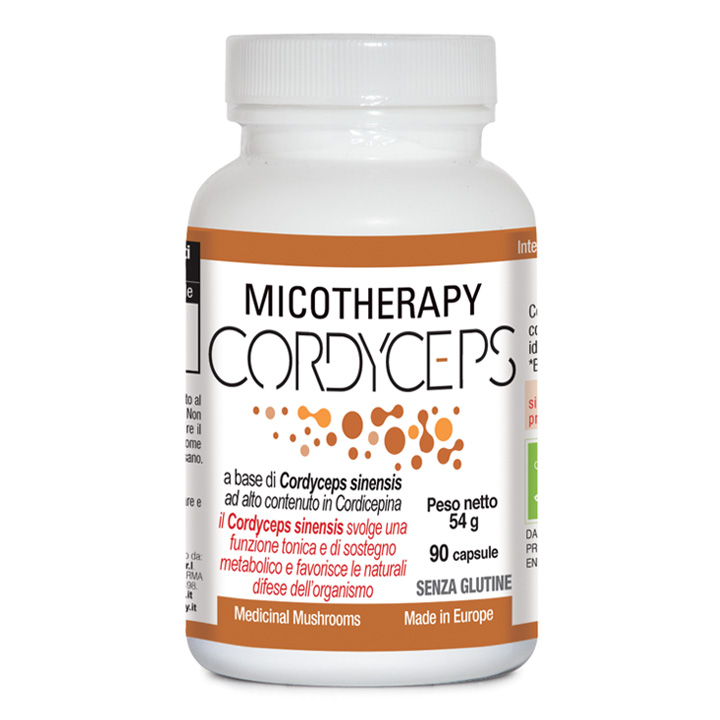
Ergogenic and tonic
Cordyceps sinensis is a medicinal mushroom with a wide range of uses. Originating in the Himalayas, it grows at altitudes above 3,000 metres and has been used in China for approximately two thousand years. In traditional Chinese medicine, it is considered a powerful tonic for the kidneys and improves our vital energy.
HEALTH BENEFITS:
Cordyceps has always been considered one of nature’s most powerful remedies. In traditional Chinese medicine, it was used for immune system support and to aid recovery in situations of convalescence, even after severely debilitating illnesses. It is now considered an anti-ageing, adaptogenic tonic that improves cellular energy use and production, and aerobic cellular metabolism, giving the body greater resistance, useful in sport performance.
PROPERTIES:
Micotherapy cordyceps contains a high level of cordycepin, a metabolit that favours the inflammation control and together with specific polysaccharides contributes to the correct production of testosterone and steroid hormones. Cordyceps sinensis contains also proteins, peptides and all essential amino acids, polysaccharides and glycoproteins with immunomodulatory effects, sterols, including ergosterol (vitamin D precursor), nucleoside analogues, polyunsaturated fatty acids, vitamins, including B1, B2, B12, E and K, and various minerals. Numerous clinical studies have shown that Cordyceps improves liver function (activation of the Kupffer cells), reduces osteoarticular inflammation, and promotes libido.
INGREDIENTS:
- Extract of Cordyceps sinensis titrated in Beta glucans – Tit. at > 30% in Total polysaccharides > 15% Beta glucans 1.3-1.6
DIRECTIONS:
2 capsule per day, preferably away from meals. Simultaneous vitamin C content is recommended, as it promotes the intestinal absorption of polysaccharides.
PACK:
packs containing 90 capsules
vegetable cellulose capsules
NOTES:
Gluten free
ICEA Organic certified product
No GMO
Made in Europe
| PLANT INGREDIENT CONTENT | PER DAILY DOSE (2 CAPSULES) |
| Cordyceps sinensis | 1000 mg |
|
Cordycepin content |
10 mg |
|
Polysaccharide content |
300 mg |
BIBLIORAPHY:
- Zhang Da-wei, et al. Cordycepin (3-deoxyadenosine) down-regulates the proinflammatory cytokines in inflammation – induced osteoporosis model. Inflammation 37.4 (2014): 1044-1049
- Zhang Da-wei, et al. Osteoprotective effect of cordycepin on estrogen deficiency-induced osteoporosis in vitro and in vivo. BioMed research international 2015 (2015)
- Ashraf, S., et al. OP0183 Cordycepin, a novel compound, reduces knee joint pathology and pain in the monosodium iodoacetate (MIA) rat model of osteoarthritis (2017): 127-128
- KM Siu, et al. Pharmacological basis of ‘Yin-nourishing’ and ‘Yang-invigorating’ actions of Cordyceps, a Chinese tonifying herb. Life Sci, December 10, 2004; 76(4): 385-95
- Li Y. et al. Clinical application of Cordyceps sinensis on immunosoppressive therapy in renal transplantation. Transplantation proceedings 2009 Vol 41 (5) 1565-1569
- Li FH, et al. Effects of corydyceps polysaccharide on liver fibrosis induced by DMN in rats. China Journal Of Chinese Materia Medica, 2006 Dec; Vol. 31 (23), pp. 1968-71
- Tuli Hardeep S., et al. Cordycepin: a bioactive metabolite with therapeutic potential. Life Sciences 93.23 (2013): 863-869.
- Lee Young-Rae, et al. Cordycepin inhibits UVB-induced matrix metalloproteinase expression by suppressing the NF-B pathway in human dermal fibroblasts. Experimental & molecular medicine 41.8 (2009): 548
- Shin, S, et al. Cordycepin suppresses expression of diabetes regulating genes by inhibition of lipopolysaccharide-induced inflammation in macrophages. Immune network 9.3 (2009): 98-105
- Shin, Seulmee, et al. Role of cordycepin and adenosine on the phenotypic switch of macrophages via induced anti-inflammatory cytokines. Immune network 9.6 (2009): 255-264
- Ramesh Thiyagarajan, et al. Cordycepin (3-deoxyadenosine) attenuates age-related oxidative stress and ameliorates antioxidant capacity in rats. Experimental gerontology 47.12 (2012): 979-987
- Hsu CC, et al. In vivo and in vitro stimulatory effects of Cordyceps sinensis on testosterone production in mouse Leydig cells. Life Sci. 2003 Sep 5;73(16):2127-36
- Chen YC, et al., Functional study of Cordyceps sinensis and cordycepin in male reproduction: A review. J Food Drug Anal. 2017 Jan;25(1):197-205
- Chang Y. et al., Effect of Cordyceps militaris supplementation on sperm production, sperm motility and hormones in Sprague- Dawley rats. Am J Chin Med. 2008;36(5):849-59



